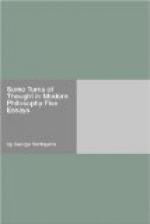“Hitherto human self-assertion in the state or the family, while serving the imperial God, has paid some grudging honours, at least verbally, to the infinite God as well, under the guise of liberalism, love of mankind, or the negation of classes. But today this imperfect homage is retracted, and nothing is reverenced except that which gives strength. If anyone preaches human kindness, it is in order to establish a “strong” community martially trained, like a super-state, to oppose everything not included within it, and to become omnipotent in the art of utilising the non-human forces of nature.... The will to return to God may prove to have been, in the history of the phenomenal world, a sublime accident.”
Certainly the will to “return to God”, if not an accident, is an incident in the life of the world; and the whole world itself is a sublime accident, in the sense that its existence is contingent, groundless, and precarious. Yet so long as the imperial God continues successfully to keep our world going, it will be no accident, but a natural necessity, that many a mind should turn to the thought of the infinite with awe, with a sense of liberation, and even with joy. The infinite God owes all his worshippers, little as he may care for them, to the success of the imperial God in creating reflective and speculative minds. Or (to drop these mythological expressions which may become tiresome) philosophers owe to nature and to the discipline of moral life their capacity to look beyond nature and beyond morality. And while they may look beyond, and take comfort in the vision, they cannot pass beyond. As M. Benda says, the most faithful Levite can return to the infinite only in his thought; in his life he must remain a lay creature. Yet nature, in forming the human soul, unintentionally unlocked for the mind the doors to truth and to essence, partly by obliging the soul to attend to things which are outside, and partly by endowing the soul with far greater potentialities of sensation and invention than daily life is likely to call forth. Our minds are therefore naturally dissatisfied with their lot and speculatively directed upon an outspread universe in which our persons count for almost nothing. These insights are calculated to give our brutal wills some pause. Intuition of the infinite and recourse to the infinite for religious inspiration follow of themselves, and can never be suppressed altogether, so long as life is conscious and experience provokes reflection.
Spirit is certainly not one of the forces producing spirit, but neither is it a contrary force. It is the actuality of feeling, of observation, of meaning. Spirit has no unmannerly quarrel with its parents, its hosts, or even its gaolers: they know not what they do. Yet spirit belongs intrinsically to another sphere, and cannot help wondering at the world, and suffering in it. The man in whom spirit is awake will continue to live and act, but with a




